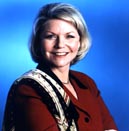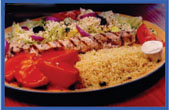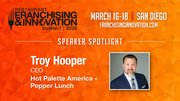Article
Selecting a restaurant consultant
The right consultant can improve your restaurant, but the wrong one can cost you money.

April 23, 2006
When George Raios decided to take Mr. Greek, his popular Canadian casual-dining chain, down a fast-casual route, he figured he knew his business well enough to do it alone. Quickly realizing he needed outside direction and strategy to make another concept work, Raios reached out for help and called 911 in the restaurant business — a consultant.
Restaurant consultants say the most successful partnerships occur when an operator knows when to ask for help. In fast casual, the trick is correctly defining the concept for the owner and the customers, said consultant Arlene Spiegel.
"You can't just put in a sofa or an upscale design and call fast food a fast casual," Spiegel said.
 |
Based in New York, restaurant consultant Arlene Spiegel is getting more fast-casual clients. She believes that it takes more than a nice sofa to claim you run a fast-casual restaurant. |
As fast-casual concepts catch on globally, several universal challenges are becoming common in the segment: cook times and arrival rates exceeding the capacity of the kitchen.
"Fast casuals need help getting services and standards to a science," Spiegel said. "They frequently need consultation to establish designs on how best to have customers order, pay for, receive and consume the food."
A fast casual excels when it can trump the declining customer service offered at a casual dining concept, said Brian Sill, president of Deterministics, a Kirkland, Wash.-based firm, who suggests an industrial engineer's approach to answer service issues.
"We analyze workflows and workloads," Sill said. "We identify bottlenecks that slow service and identify where there is wasted capacity or wasted labor."
Doug Fisher, president of Canada's FHG International Inc., is the consultant who helped Raios morph Mr. Greek into another branch of his company, a branch of Mr. Greek Express stores. He helped Mr. Greek Express offer guests the same top-quality cuisines without the wait. Mr. Greek Express has a pared down menu lending itself to carryout, catering and limited dine-in services. The menu includes saganaki, spinach and cheese dip, gyro appetizers, spanakopita and feta bruschetta.
In the beginning of any new addition or change, Fisher said, owners and operators tend to be overly optimistic, not looking for any negatives in their business or their approach to a new phase.
 |
Mr. Greek Express offer guests the same top-quality cuisines without the wait. |
"I see a lot of operators operating without a clear vision," said Karen Malody, principal of Culinary Options, a Seattle-based consulting firm. "It's amazing how unclear some people are. They've remodeled, changed vendors, changed the menu and are still not getting the performance they're looking for. They've made so many haphazard changes."
The operators' confusion, and ultimately the customers', could have been avoided had there been a clear plan from the start, she said.
"You have to get the client to clarify their vision and draw a line in the sand. The consultant needs to be the one to hold them to it," Malody said. Inevitably owners will want, for example, to start adding new items to the menu, bring in a new computer system or rearrange the food delivery, and it's the consultant's job to take them back to the vision statement and see if it makes sense.
"It's helping people stay true to themselves," she said.
The consultant Yellow Pages
Finding the right consultant makes all the difference, said Tony Hughes, restaurant managing director for Mitchells & Butlers, the United Kingdom's operator of nearly 2,000 pubs, bars and restaurants.
"You don't pick a consultant out of a phone book," Hughes said, adding that operators should find someone who has worked with a peer they respect, as he did when he hired Sill. "We'll work with anyone who can help us and educate us, but positive word of mouth is everything."
Hiring a consultant is no different than hiring for any other role in a restaurant, said Colleen McShane, president of the Illinois Restaurant Association. Reference and backgrounds checks are essential, she said.
"Always get two opinions," McShane said. "It's incumbent on the restaurant owner to determine whether that consultant and they will work well together."
State restaurant associations generally provide names of consultants for those seeking help. Most states only refer consultants who are members of the association.
Both Sill and Speigel are members of Foodservice Consultants Society International, an association of restaurant consultants. The association has a referral program open to any restaurateur looking for help. For more information, visit fcsi.org.
"If they sign up as a member, it shows a commitment to the greater restaurant industry," said Elizabeth Peters, of the Oregon Restaurant Association. "There's a level of trust that's there."
Yet simply possessing a background in food or restaurants does not a good consultant make, consultants and operators said. A restaurant owner should examine a consultant's education, experience and years spent consulting.
"Some are really unemployed restaurant managers," Fisher said. "Unfortunately in the consultant industry, we're not regulated like a lawyer or doctor would be."
Spiegel warns against consultants with ties to particular suppliers who may recommend using equipment not because it's the best available for the job, but because the manufacturer would reward her.
"A true ethical consultant will never recommend a client or service that they would benefit from," she said. The ultimate decision lies with the operator, who must figure out which consultant is best for their needs. While a consultant's tasks differ from job to job, their goal should stay the same, Spiegel said.
"Roles can vary, but you want someone with no other agenda but to make you successful," she said.
Hughes takes another approach.
"I don't ever blame consultants," Hughes said. "I blame the people who employ them. People want a magic fix, and naive people will always be susceptible to (hiring) not very good consultants."
Consultant / AnalystSafetySandwichRestaurant Design / LayoutEquipment & SuppliesSoftwareMarketingSelf ServiceCurbside & TakeoutIndependent RestaurantFranchisingOperationsFood & Beverage
Related Media
Food & BeveragePresented ByOracle
Presented ByOracle
 ChatGPT
ChatGPT Grok
Grok Perplexity
Perplexity Claude
Claude












